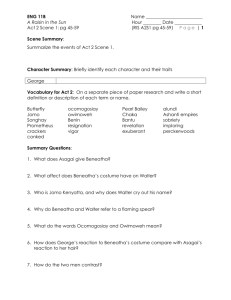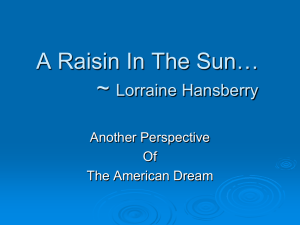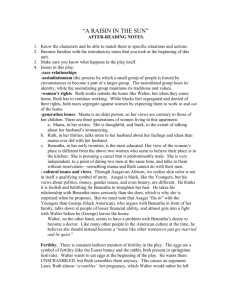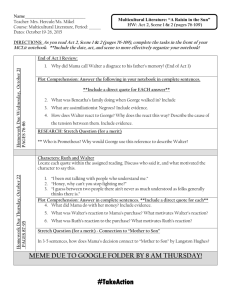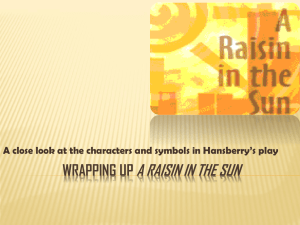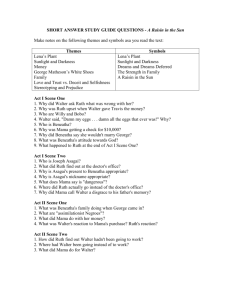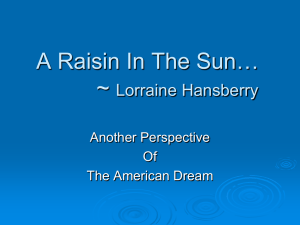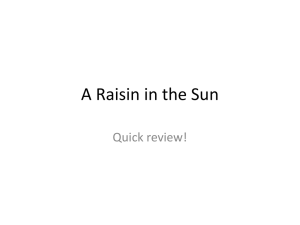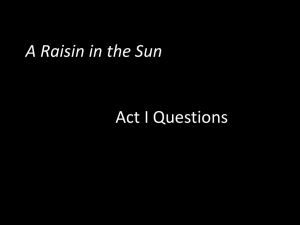A Raisin in the Sun Study Guide Format Comprehensive Review
advertisement
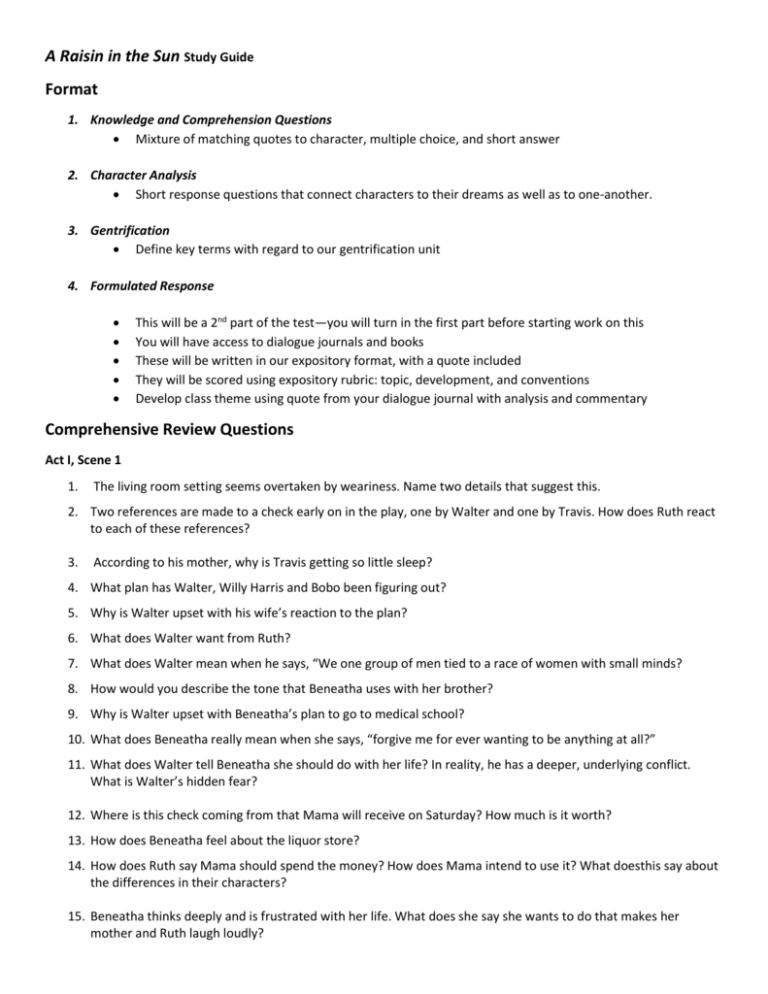
A Raisin in the Sun Study Guide Format 1. Knowledge and Comprehension Questions Mixture of matching quotes to character, multiple choice, and short answer 2. Character Analysis Short response questions that connect characters to their dreams as well as to one-another. 3. Gentrification Define key terms with regard to our gentrification unit 4. Formulated Response This will be a 2nd part of the test—you will turn in the first part before starting work on this You will have access to dialogue journals and books These will be written in our expository format, with a quote included They will be scored using expository rubric: topic, development, and conventions Develop class theme using quote from your dialogue journal with analysis and commentary Comprehensive Review Questions Act I, Scene 1 1. The living room setting seems overtaken by weariness. Name two details that suggest this. 2. Two references are made to a check early on in the play, one by Walter and one by Travis. How does Ruth react to each of these references? 3. According to his mother, why is Travis getting so little sleep? 4. What plan has Walter, Willy Harris and Bobo been figuring out? 5. Why is Walter upset with his wife’s reaction to the plan? 6. What does Walter want from Ruth? 7. What does Walter mean when he says, “We one group of men tied to a race of women with small minds? 8. How would you describe the tone that Beneatha uses with her brother? 9. Why is Walter upset with Beneatha’s plan to go to medical school? 10. What does Beneatha really mean when she says, “forgive me for ever wanting to be anything at all?” 11. What does Walter tell Beneatha she should do with her life? In reality, he has a deeper, underlying conflict. What is Walter’s hidden fear? 12. Where is this check coming from that Mama will receive on Saturday? How much is it worth? 13. How does Beneatha feel about the liquor store? 14. How does Ruth say Mama should spend the money? How does Mama intend to use it? What doesthis say about the differences in their characters? 15. Beneatha thinks deeply and is frustrated with her life. What does she say she wants to do that makes her mother and Ruth laugh loudly? 16. Why does Beneatha really not want to marry George Murchison? Act I, Scene 2 1. At the beginning of this scene, the family is cleaning the apartment, and several details further explain the Youngers’ living conditions. Which detail offers a complete picture of the environment in which the Youngers live and explain why it does so 2. Why is Ruth upset when she returns home? Why do you suppose this makes her so unhappy? 3. Who is Joseph Asagai? What is implied about the relationship between him and Beneatha? 4. What does Asagai give to Beneatha as a gift? Why is Beneatha pleased with it? How does Asagai react? 5. What stereotypes about women does Asagai reveal? What is Beneatha’s opinion about a relationship with Asagai? 6. Why does Beneatha thank Asagai for the nickname? 7. When the postman brings the check for $10,000, Mama is overjoyed and then worried. Explain her conflicting feelings. 8. What does Walter ask as soon as he comes in the door? Why does he shout? What is his reaction to Mama’s refusal to invest in a liquor store? 9. What concern does Mama have about Walter’s frequent times away from home? 10. How does Walter explain his discontent about his job and his future? Why is Mama “proud of … what we done”? Who is “we” in her statement? 11. Why does Walter crumple his papers, make an angry speech, and head out of the apartment? 12. What news does Mama tell Walter about Ruth? What is Walter’s initial reaction? 13. To what does Mama refer when she says, “You are a disgrace to the memory of your father? 14. Describe Walter. What are his dreams, his frustrations, his problems? 15. By the end of Act I, what have we learned about Ruth? 16. By the end of Act I, what have we learned about Beneatha? 17. What negative situations in the Youngers’ lives are making their conflicts worse? What positive aspects may help them resolve their problems? Act II, Scene 1 1. What is the setting at the beginning of this scene? How is it different from the end of Act I? 2. What is Walter’s reaction to Beneatha’s mood? 3. What is George’s reaction to Walter and Beneatha performing their African dance? 4. George says: “We’re going to the theatre – we’re not going to be in it.” What does he mean? 5. What is Beneatha’s definition of assimilationism? How does this definition present conflict for Beneatha? 6. What does Walter say about George’s father? Why does Walter feel that he and George’s father have much in common? 7. How do Walter and Ruth describe their relationship? 8. What news does Mama bring home, and why do Ruth and Walter react as they do? Why is this both good news and bad news? 9. Do you think that Walter’s closing comments to Mama beginning “What do you need me…” are justified? Explain. Act II, Scene 2 1. Explain the disagreement between Beneatha and George regarding studying or education. How does the argument end? 2. Beneatha thanks her mother for understanding her. Specifically what understanding does Beneatha mean? 3. Explain Walter’s attitude about his job. As a result, what does Walter try to do? 4. When Walter returns, what does Mama learn? 5. What does Mama do after she hears about Walter’s three days? 6. Walter says, “You trust me like that?” To what is he referring? 7. Describe the fantasy world that Walter paints to Travis when he tells him of his plans for the future. Act II, Scene 3 1. What is the atmosphere at the opening of the scene? 2. How has the Younger family changed at the end of the week? 3. Identify Walter’s change in attitude towards Beneatha. 4. What dream does Mr. Lindner mention? 5. Explain the irony in Beneatha’s statement: “This, friends, is a Welcoming Committee!” 6. Where is the irony in Lindner’s statement: “People can get awful worked up when they feel that their whole way of life and everything they’ve ever worked for is threatened.” 7. Why does Lindner claim to want them not to live there? 8. When she is asked about her plant, Mama replies, “It expresses me.” Explain the significance of the wording that she chooses. Also, explain the symbolism in what she states. 9. How is the gift appropriate for Mama? 10. Why does Ruth look “as though somehow she senses death”? 11. What news does Bobo bring to Walter? 12. Why does Walter say, “That money is made out of my father’s flesh”? 13. Besides the money, what else will the loss mean for the family? 14. Why is the ending scene appropriate to the Younger family and to Mama in particular? Act III 1. Why is the lighting in Act III different from the lighting in Act I? 2. Explain Beneatha’s “life as a circle” speech. What is the symbolism of her idea? 3. According to Asagai, Beneatha should be grateful to Walter. Why? 4. What does Ruth say to Mama when Mama starts talking about calling to cancel the moving van? 5. Walter comes in and says that he called “the man.” What does Walter say that he has learned? Why did he call Lindner? 6. Why does his sister say, “He’s no brother of mine”? 7. When Lindner arrives, what does Walter tell him? 8. What causes Walter to say what he does to Lindner? 9. What does Mama mean when she says, “He finally come into his manhood today, didn’t he? Kind of like a rainbow after the rain”? 10. What are the dreams of all major characters?

